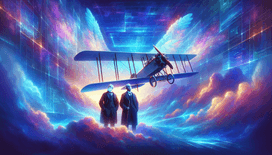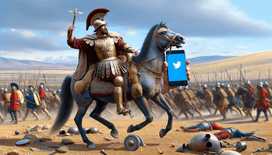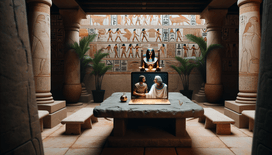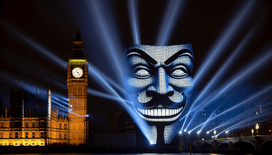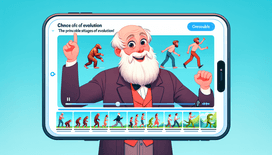Picture yourself, dear reader, in the lush, rolling fields of Waterloo in 1815, with not a pair of jubilant wellies in sight. Instead, two immense armies loom, poised for perhaps the most consequential clash in European history. On one side, we have the determined Duke of Wellington, and on the other, the indomitable Napoleon Bonaparte. But this time, let's sprinkle a twist of modern magic into the mix: artificial intelligence assistants. Can you see where this might be heading? Spoiler alert, it’s not to the nearest exit.
Napoleon's AI Conquest
Napoleon, the strategic genius, always looked for an edge, and an AI assistant might have been his ultimate weapon, sans cannon. One imagines Napoleon calling his AI assistant, let's dub it Napol-Bot, for a quick strategy session.
"Napol-Bot! Give me a breakdown of enemy troop movements with a dash of weather predictions, if you please," he'd demand with his Corsican flair.
Napol-Bot's swift processing power would surely relay, "Your Majesty, Wellington's forces are fortifying the Mont-Saint-Jean ridge, and a cheeky drizzle is scheduled at precisely 1400 hours." Armed with this knowledge, Napoleon could adjust his tactics with the foresight of a chess grandmaster, sweeping across the board with calculated élan.
The Duke and Digital Dexterity
Meanwhile, on the British side, the Duke of Wellington, a seasoned veteran in his own right, showcases the quintessential stiff upper lip. Yet, there's no pretending that he’s beyond a little help from an AI friend, say, Welli-AI.
"Welli-AI, old chap, time for tea and tactics," Wellington might quip as he readies his battle plans.
Welli-AI, splendidly British in its formality, would chirp, "Good day, my Duke. I’ve compiled an optimal allocation of our forces based on enemy formations and, of course, some appropriately British biscuit recommendations." The Duke could then deploy his men with Georgian grace, ensuring both tactical prowess and proper snacks for every regiment.
Much Ado About Algorithms
The true test of AI's battlefield brilliance might come during the infamous charge of the Imperial Guard. Imagine: amidst the smoke and screams of clashing steel, AI assistants furiously recalibrate strategies. "Profunduli, avert eyes," Welli-AI might say, reminding Wellington of the power of surprise. Perhaps, an algorithmic pattern recognition discovers a subtle inconsistency in enemy movement, a weak flank, if you will.
Napol-Bot could retort, "Recalculate defensive positions and brace for counterplay," allowing Napoleon to twist the military narrative with an algorithm-driven plot twist. The day might oscillate back and forth, like the latest popular rhythm game, as AI strategised on-the-fly like maestros of machine and man.
Obsolescent Officers?
But alas, the drama of Waterloo's techno-vortex leaves us with existential questions. Would commanders have become mere vessels for AI insights, or could man and machine have harmoniously melded into the greatest duet since Albion & Algiers: A Seafaring Love Story?
Indeed, the ghosts of Generals past might lament the rise of technology, fretting that future leaders are just shadows in the glow of AI supremacy. Then again, the art of war has always been one of adaptation, hasn’t it? From gunpowder to the telegraph, from crossbows to AI assistants, where would the boundary blur if not at Waterloo?
The Aftermath of Alt-Reality
Imagine, my inquisitive reader, the post-battle tea with history rewritten. Would Napoleon have triumphed and consequently reshaped the European landscape, or might Wellington still have slipped victory into his military pocket, thanks to a well-timed AI quip? Here, Timewarp Terry, a humble bard of the bits, suggests that the true victor might have been the potential for cooperation. After all, who wins in a world where enemies become collaborators through the power of shared ones and zeros?
In our reflections on Stones, Waterloo, and Wi-Fi, we glimpse the tantalising tangents of history's colourful kaleidoscope. Were this absurd what-if painting to take form on a digital canvas, what grand portrait might emerge? Perhaps 'tis better to trust in the sails of our imagination, keeping alive the ancient art of what-ifery, best enjoyed with a healthy dash of humour and a spot of historical tea.


